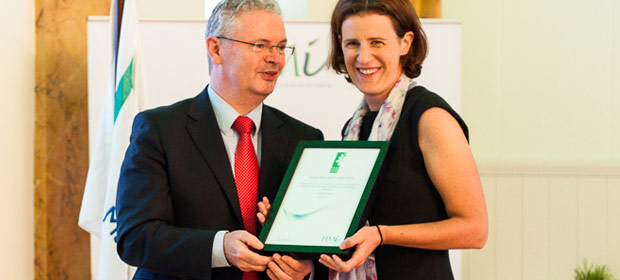Dietician Niamh Smyth, a recent regional winner at the HMI Regional Awards, outlines how she, along with a team involving dietetics, pharmacy, facilities, nursing and the ICT department, introduced an Electronic Ordering System for Enteral Tube Feeding Products.

Following a study in 2011, it was found that one in four adults admitted to the hospital were at risk of malnutrition. Inadequately nourished patients suffer more complications, have poorer outcomes and are less able to withstand the effects of medical treatment or surgery. Consequently, they spend longer in hospital and are more likely to need long term care than normally nourished patients.
Nutritional support such as enteral tube feeding is indispensable for patients unable to fulfil their nutritional needs orally. For at risk patients nutrition intervention needs be ordered promptly and fully implemented. Barriers to this ideal must be removed. Prior to this project, there was no structured ordering, dispensing or storage system in place for enteral tube feeding products.
The pre-existing paper ordering system demonstrated an 87% error rate, resulting in a two hour delay in dispensing products to the ward.
The pre-existing paper ordering system demonstrated an 87% error rate, resulting in a two hour delay in dispensing products to the ward. The system also demonstrated a high wastage of stock and personnel time. Using a team based approach an electronic ordering system which interfaces directly with pharmacy was developed. Dieticians took responsibility for sending the electronic order. Storage areas were centralised and reduced from fourteen to three.
An initial evaluation shows the steps taken to dispense these products have been reduced by one third; products are now dispensed within 15 minutes. To date there have been no discrepancies in the amount of products ordered and stock on the ward indicating a 100% compliance with the new process. Pharmacy porters restock the storage areas three times a week, a 70% reduction. The volume of feed dispensed to the wards has decreased by 34%.
The project, undertaken as part of a Master’s degree in Leadership*, has enhanced the quality of nutritional care to nutritionally at risk patients by improving effectiveness and efficiency in work practices. The paper ordering system process has been eliminated. The ambiguity around the storage of enteral tube feeding products on the wards has been removed. This enables nursing staff more time for direct patient care which improves patient safety. Pharmacy staff have access to accurate and comprehensive information through the electronic system improving safety and reducing the time taken to dispense the products. Dieticians can now order enteral tube feeds and be assured that their nutrition care plan will be fully implemented in a timely manner.
In the coming year, the project will be presented at hospital and national conferences to share the findings across the health sector.
*MSc Leadership course was jointly funded by the Hospital and the Meath Foundation

